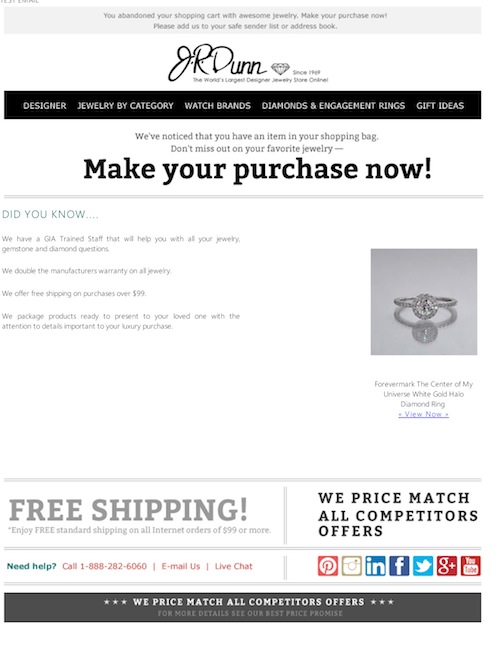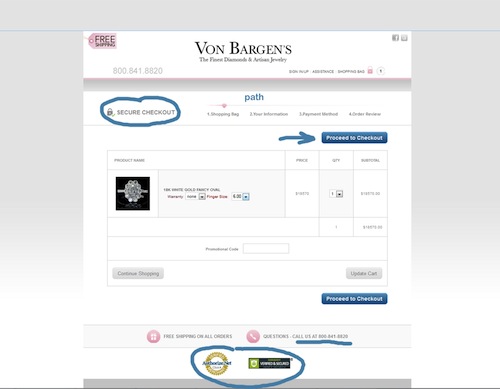How To Deal With Shopping Cart Abandonment And Close The Sale Online
February 07, 2018 (0 comments)
We’ve all done it: walked away from the computer after placing items in an online shopping cart. It's easy to get distracted and even easier on occasion not to spend money. Or to think about spending it later. It's called shopping cart abandonment, and it's a real problem for many online sellers.
By one estimate, 60-70% of shopping carts are abandoned before checkout. Happily, it's possible to get some of that missing revenue back.
The Centurion spoke with jewelers who have robust e-commerce sites in addition to their bricks and mortar stores, to find out how they deal with cart abandonment issues. For some experienced jewelers, the solution is still in the near future. "We're evaluating our options right now with several local companies," says Susan Eisen of
Susan Eisen Fine Jewelry, El Paso, TX. "We've been selling jewelry online for four years and our
lifetags online for twice that long, so we're working on a good solution."
For others, email is a key solution. "We send an email when a shopping cart is abandoned," says
Smyth Jewelers' Sonja Jones, inventory manager of Smyth Jewelers (based in Timonium, MD). The jeweler processed more than 2,000 orders from Black Friday through Christmas. Though miniscule by Amazon standards, it’s a huge number for Smyth, especially since they processed just a few hundred only a year ago.
While the Internet produces only a small proportion of Smyth’s overall sales, the jeweler still takes the abandoned carts seriously and has experienced a learning curve to find out how to best serve their customers. In the second week of December 2013, the jeweler had 39 abandoned carts with 250 completed sales, while last week it 13 abandoned carts with 25 completed sales.
According to Jones, originally an abandoned cart's attached email address received three emails. After a small number of complaints, the company decreased the number and now has good success. "It's the personal touch," says Jones. "The email begins with 'Hi, my name is…' and we offer the customer help. Some people do need help to finish an online sale. Others may wish to come in and finish the sale in person."
Kara Mangiere, Director of E-Commerce for
J.R.Dunn Jewelers, Lighthouse Point, FL, also finds an email outreach helpful. "In November we instituted a trigger email campaign that reminds customers of their abandoned cart eight hours later. The email (below) displays images of items left in the cart as well as a list of benefits of purchasing from JR Dunn Jewelers."

Mangiere also shares their rate. "We are seeing only an 18% cart abandonment rate. Extremely low compared to most e-commerce sites. Some of the factors that I believe attribute to this are: the customer visiting us has a stronger intent to purchase initially as they are using longer tail searches to find us; we post several security and trust icons; and we display our toll free number on the top of every page."
(Editor’s note: a “long tail” search refers to the ongoing residual searches for, and hits to, a website long after the initial spike driven on by marketing or new search-engine placements wears off.)
Von Bargen's Jason Thom, also sees that specific procedures help keep the abandoned cart rate low. With locations in NH and VT, the company also reaches out to customers via the web and ecommerce. Thom shares some of his lessons, in no particular order.
- "Show a map of the check-out process to reduce anxiety. Utilize an indicator demonstrating their progress as they proceed through check-out process.
- Remove noise or distractions (main menus, etc.) from the check-out process. This will keep the focus on the task at hand: checking out.
- Use trust symbols and terminology. ‘Secure Check-Out’ is better than ‘Check-out.’
- Display your phone number so they can call for assistance.
- Use call out to action buttons." (See Thom's notations on the company's example below.)

Jeff Arnold of
4SpotMarketing also had some advice to offer to jewelers with cart abandonment problems, which he offers to jewelers as part of his company's e-commerce solutions.
1. "One of the easiest and most immediate things you can do, but not always the best financial decision, is to have a
pop-up trigger once someone starts to leave the cart page. Many times it is a pop-up that says that “we want to earn your business in the long term, so here’s a discount for this purchase” and it shows a coupon code that they can use immediately. Sometimes that discount is enough to get them back to finish the purchase. This is especially helpful if there is a ‘limited time offer’ tied to the coupon (redeem this today only for a 10% discount), etc."
2. "Have a
dynamic CRM system set up on the back-end of your site so that your cart integrated with a system that can automatically follow-up with people. You’ve probably had this happen to you (if you do any shopping online). You go to a site, add something to the cart, then leave. If they have a dynamic system set up on the back-end and have captured at least an email address during the sign-up process to click-through process, they can email that person reminding them that they left something in their cart and entice them to come back. If they don’t return in one day, another e-mail with a coupon code to try to get them back, etc. This process can go on for days or weeks to try to get someone back to the site."
3. "
Google Remarketing – Part of Google’s click-ad system now is for people to be ‘followed’ throughout their Internet travels after they have visited your site. So, a jeweler would set up their click ad campaign, put some code on their site, and then after someone visits their engagement ring page (for example), they could then show their logo and engagement rings across Google’s vast advertising network so that their ad keeps showing to that person, helping to drive them back to the jeweler’s website."
So while no one answer works for each company, there are solutions that do work. For additional in-depth ideas, here's a
white paper from Silverpop, an Atlanta-based company specializing in digital marketing technology, including CRM systems.
 Mangiere also shares their rate. "We are seeing only an 18% cart abandonment rate. Extremely low compared to most e-commerce sites. Some of the factors that I believe attribute to this are: the customer visiting us has a stronger intent to purchase initially as they are using longer tail searches to find us; we post several security and trust icons; and we display our toll free number on the top of every page." (Editor’s note: a “long tail” search refers to the ongoing residual searches for, and hits to, a website long after the initial spike driven on by marketing or new search-engine placements wears off.)
Von Bargen's Jason Thom, also sees that specific procedures help keep the abandoned cart rate low. With locations in NH and VT, the company also reaches out to customers via the web and ecommerce. Thom shares some of his lessons, in no particular order.
Mangiere also shares their rate. "We are seeing only an 18% cart abandonment rate. Extremely low compared to most e-commerce sites. Some of the factors that I believe attribute to this are: the customer visiting us has a stronger intent to purchase initially as they are using longer tail searches to find us; we post several security and trust icons; and we display our toll free number on the top of every page." (Editor’s note: a “long tail” search refers to the ongoing residual searches for, and hits to, a website long after the initial spike driven on by marketing or new search-engine placements wears off.)
Von Bargen's Jason Thom, also sees that specific procedures help keep the abandoned cart rate low. With locations in NH and VT, the company also reaches out to customers via the web and ecommerce. Thom shares some of his lessons, in no particular order.
 Jeff Arnold of 4SpotMarketing also had some advice to offer to jewelers with cart abandonment problems, which he offers to jewelers as part of his company's e-commerce solutions.
1. "One of the easiest and most immediate things you can do, but not always the best financial decision, is to have a pop-up trigger once someone starts to leave the cart page. Many times it is a pop-up that says that “we want to earn your business in the long term, so here’s a discount for this purchase” and it shows a coupon code that they can use immediately. Sometimes that discount is enough to get them back to finish the purchase. This is especially helpful if there is a ‘limited time offer’ tied to the coupon (redeem this today only for a 10% discount), etc."
2. "Have a dynamic CRM system set up on the back-end of your site so that your cart integrated with a system that can automatically follow-up with people. You’ve probably had this happen to you (if you do any shopping online). You go to a site, add something to the cart, then leave. If they have a dynamic system set up on the back-end and have captured at least an email address during the sign-up process to click-through process, they can email that person reminding them that they left something in their cart and entice them to come back. If they don’t return in one day, another e-mail with a coupon code to try to get them back, etc. This process can go on for days or weeks to try to get someone back to the site."
3. "Google Remarketing – Part of Google’s click-ad system now is for people to be ‘followed’ throughout their Internet travels after they have visited your site. So, a jeweler would set up their click ad campaign, put some code on their site, and then after someone visits their engagement ring page (for example), they could then show their logo and engagement rings across Google’s vast advertising network so that their ad keeps showing to that person, helping to drive them back to the jeweler’s website."
So while no one answer works for each company, there are solutions that do work. For additional in-depth ideas, here's a white paper from Silverpop, an Atlanta-based company specializing in digital marketing technology, including CRM systems.
Jeff Arnold of 4SpotMarketing also had some advice to offer to jewelers with cart abandonment problems, which he offers to jewelers as part of his company's e-commerce solutions.
1. "One of the easiest and most immediate things you can do, but not always the best financial decision, is to have a pop-up trigger once someone starts to leave the cart page. Many times it is a pop-up that says that “we want to earn your business in the long term, so here’s a discount for this purchase” and it shows a coupon code that they can use immediately. Sometimes that discount is enough to get them back to finish the purchase. This is especially helpful if there is a ‘limited time offer’ tied to the coupon (redeem this today only for a 10% discount), etc."
2. "Have a dynamic CRM system set up on the back-end of your site so that your cart integrated with a system that can automatically follow-up with people. You’ve probably had this happen to you (if you do any shopping online). You go to a site, add something to the cart, then leave. If they have a dynamic system set up on the back-end and have captured at least an email address during the sign-up process to click-through process, they can email that person reminding them that they left something in their cart and entice them to come back. If they don’t return in one day, another e-mail with a coupon code to try to get them back, etc. This process can go on for days or weeks to try to get someone back to the site."
3. "Google Remarketing – Part of Google’s click-ad system now is for people to be ‘followed’ throughout their Internet travels after they have visited your site. So, a jeweler would set up their click ad campaign, put some code on their site, and then after someone visits their engagement ring page (for example), they could then show their logo and engagement rings across Google’s vast advertising network so that their ad keeps showing to that person, helping to drive them back to the jeweler’s website."
So while no one answer works for each company, there are solutions that do work. For additional in-depth ideas, here's a white paper from Silverpop, an Atlanta-based company specializing in digital marketing technology, including CRM systems.


